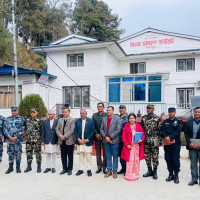- Friday, 27 February 2026
Top-down Digital Revolution
Vietnam’s growing e-learning business has attracted the attention of Apple CEO Tim Cook, who visited the country in 2024. In 2022, Vietnam embarked on a journey towards a digital transformation of its education system. During the pandemic, the country quickly shifted to online and distance learning. A government-initiated project running from 2022 to 2025 now aims to integrate digital technology across all levels of the education system. Technology is intended to promote innovation in teaching and learning and to improve the quality and accessibility of education.
Given its political system, the Vietnamese example is a special one. The one-party government is taking a top-down approach to driving the country’s digital transformation by mandating the use of learning management systems (LMS) and prioritising digital skills training. It draws on the experiences of other Asian countries, such as South Korea and Singapore, where state-led education reforms have been key drivers of economic transformation.
In 2023, UNESCO reported that nine out of 10 schools across the country are connected to the internet: “With one of the fastest growing markets for online learning, Vietnam has enormous opportunities to establish itself as a leading regional education hub and a global example.”
To this end, the government has invested in expanding its digital infrastructure. It has partnered with public telecommunications companies, such as VNPT and Viettel, to provide internet access in previously underserved regions, particularly rural areas. Furthermore, it has launched initiatives to provide devices and connectivity to students in need and to target disadvantaged groups, such as ethnic minorities and rural communities.
Vietnam’s growing educational technology (EdTech) sector is also playing its part: Companies have provided access to learning apps and online platforms that facilitate communication between students, parents and schools. Phan An, founder and CEO of WordsMine, a Vietnamese EdTech company, said: “We’re using an AI-powered platform to deliver knowledge across subjects like finance, mathematics and history – with a focus on empowering young people, including female students, and Indigenous communities in rural areas – helping to close the knowledge gap created by language barriers.”
Nevertheless, there is still a lack of digital libraries, e-learning tools and resources, such as e-books, particularly in regions where traditional educational resources are already scarce, such as rural areas. A robust digital education system requires teachers who are well-trained in using modern tools and can provide students with individual support. Although Vietnam has trained over 2000 teachers in digital skills, many schools still lack the specialists needed to maintain digital resources.
“Despite government policies supporting the move towards increased use of digital education, many educational institutions still employ a more traditional teacher-centred approach, which is not well aligned with digital education and skills required for Industry and Education 4.0,” says Sasha Stubbs, Learning Design Manager at RMIT University Vietnam.
However, study programmes are beginning to address this gap. For instance, Hanoi University of Science and Technology’s Bachelor of Education Technology programme prepares teachers for digital learning environments. At RMIT University Vietnam, collaboration between educators is encouraged. Major challenges remain in Vietnam’s education sector, particularly in rural areas, where access to infrastructure, digital equipment and qualified teachers is limited. That said, the digital-education revolution in Vietnam appears promising overall.
According to a recent study, Vietnamese students with access to digital tools achieved higher test scores than their peers without such resources. The country is prioritising teacher training and trying to overcome regional and gender disparities. The next steps are already in the pipeline, to increase AI usage: Perhaps one day soon, chatbots will be telling Vietnamese students whether their maths homework is correct.
-Development And Cooperation
















